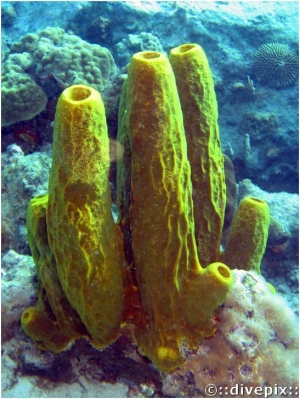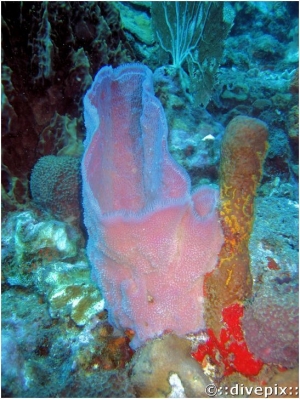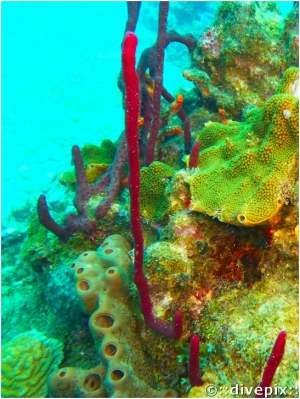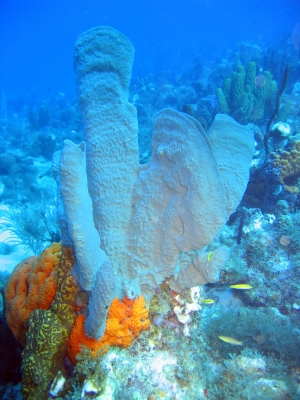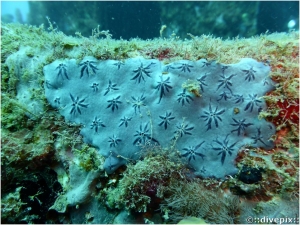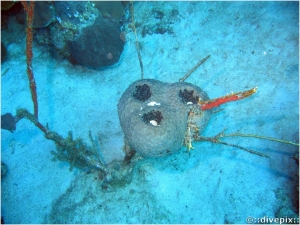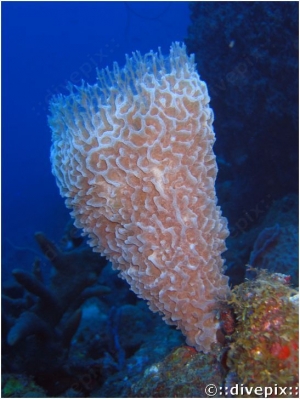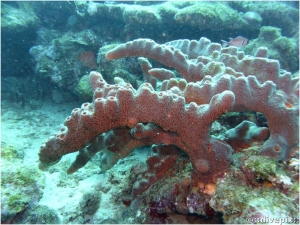




Eric H. Biass
Saturday, 02 February 2013 14:44
Yellow Tube Sponge
| Aspect: | Yellow rubbery tubular structure |
| Population: | Ubiquitous. |
| Notable feature: | Usually bright yellow, but depending on surrounding phytoplankton exsudes dyes of various colours, especially purple, green and brown. |
| Environment: | Grows on any solid structure in open waters including on shipwrecks at depths of 40 metres. |
| Behaviour: | - |
Published in
Sponges
Tagged under
Saturday, 02 February 2013 14:27
Pink Vase Sponge
| Aspect: | Pink to Yellow thin-walled vase or bowl-shaped structure. Several may branch off a common base. |
| Population: | Common. |
| Notable feature: | Outer surface composed of tight array of thin ridges that sometimes may point outwards of form studs. The ridges taper off towards the upper edge of the vase to form a short lace-like brim (a feature that readily distinguishes it from the more radical Azure Vase Sponge, q.v.) |
| Environment: | Atop coral formations, and even through encrusting sponges. |
| Behaviour: | - |
Published in
Sponges
Tagged under
Saturday, 02 February 2013 14:13
Orange Elephant Ear
| Aspect: | Yellow to red rubbery mass, usually attached to a rock protrusion. Can develop into truly seizeable masses. |
| Population: | Common. |
| Notable feature: |
Smooth rubbery texture with a dense array of excurrent holes of various dimensions. May develop ear-shaped wings, hence the elephant connotation in the designation. Like Giant Barrel Sponge, appears to be a favourite meal for Hawkbill Turtles (the Green Turtle variety being essentially herbivorous) as evidenced by one of the photos below. |
| Environment: | Generally well swept waters. |
| Behaviour: | - |
Published in
Sponges
Tagged under
Saturday, 02 February 2013 14:08
Erect Rope Sponge
| Aspect: | Bright red, purple or brown, can adopt vatious configurations, but all eventually turn upwards to grow vertically. |
| Population: | Common |
| Notable feature: | Excurrents (holes) are scattered but have plain edges (no lips) |
| Environment: | No real rule. |
| Behaviour: | - |
Published in
Sponges
Tagged under
Saturday, 02 February 2013 12:52
Branching Vase Sponge
Published in
Sponges
Tagged under
Saturday, 02 February 2013 12:38
Branching Tube Sponge
| Aspect: |
Clusters of very irregularly shaped thick-walled tubes, with usually topped by smaller diameter excurrent openings. COLOUR: Colour can vary considerably, a fact that is augmented by drastic variations depending on light source and distance (from green to heather for example) as shown below in a cluster of four photos of the same group of specimens. Textures can range from bumpy rubber to dimpled leather. |
| Population: | Common. |
| Notable feature: | Tubes may grow out from a central root point or developed side-by-side. Inner walls usually yellow. |
| Environment: | Often anchor on a rocky substrate. |
| Behaviour: | - |
Published in
Sponges
Tagged under
Saturday, 02 February 2013 12:32
Blue Star Encrusting Sponge
| Aspect: | Thin blue encrusting hard rubbery cushion with star-shaped network of veinous canals radiating from the excurrent openings. The "stars" are not connected. |
| Population: | Common. |
| Notable feature: | Generally blue as the caerulea (sky colour) in the latin scientific designation implies and ommited in the English designation, but pink variations not rare. |
| Environment: | Relatively flat surfaces, wreck hulls included, down to at least 25 metres. |
| Behaviour: | - |
Published in
Sponges
Tagged under
Saturday, 02 February 2013 12:14
Black Ball Sponge
| Aspect: | Generally a hard (not "spongy") dark grey or black ball with irregular outer surface and openings at its top (excurrents), an overall shaped that is somewhat reminiscent of a large wasp's nest. |
| Population: | Common. |
| Notable feature: | Outer surface can be as rough as a pinaple, and colour, as testified by specimens photograhed below, may also be dark red or brown. |
| Environment: | Shallow waters, attaches to a variety of structures. |
| Behaviour: | - |
Published in
Sponges
Tagged under
Saturday, 02 February 2013 11:49
Azure Vase Sponge
| Aspect: | Generally deep-V shaped vase sponge reflecting almost fluorescent light blue (azure) pink or light orange colours. |
| Population: | Common. |
| Notable feature: | Extremely elaborate outer surface composed of sharp random ridges tapering off to a very delicate translucent skinned lace brim. |
| Environment: | Tends to grow off coral boulders. |
| Behaviour: | - |
Published in
Sponges
Tagged under
Saturday, 02 February 2013 00:08
Brown Tube Sponge
| Aspect: | Generally, but not always, grows in the shape of Ibex horns, with excurrents protruding in-line from their upper edge. |
| Population: | Common. |
| Notable feature: | Usually brown or beige, but sometimes pink. Often inhabited by parazoanthids as shown in one of the close-up views herewith. |
| Environment: | Quiet and relatively shallow waters. |
| Behaviour: | - |
Published in
Sponges
Tagged under



